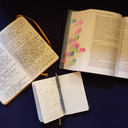Case 3 : Chu-Chih Raises One Finger
Translation: Robert Aitken, The Gateless Barrier, 1990.
The Case
Whenever Chu-chih was aked a question, he simply raised one finder. One day a visitor asked Chu-chih’s attendent what his master preached. The boy raised a finger. Hearing of this, Chu-chih cut off the boy’s finger with a knife. As he ran from the room, screaming with pain, Chu-chih called to him. When he turned his head, Chu-chih raised a finger. The boy was suddenly enlightened.
When Chu-chih was about to die, he said to his assembled monks: “I received this one-finger Zen from T’ien-long. I used it all my life but never used it up.” With this he entered into his eternal rest.Wu-men’s comment
The enlightenment of Chu-chih and the boy has nothing to do with the end of a finger. If you can realize this, then T’ien-lung, Chu-chih, the boy, and you yourself are all run through with a single skewer.
Wu-men’s verse
T’ien-lung made a fool of old Chu-chih
who cut the boy with a sharp blade,
just as the deity Chu-ling raised his hand,
and Hua-shan, with its many ridges, split into two.
Notes
Case 3 of Gateless Barrier is also:
- Case 84 of Book of Serenity, “Judi’s ‘One Finger’”
- Case 245 of Dogen’s Shinji Shobogenzo, “Juzhi Holds Up One Finger”
Book of Serenity Case 84 has some comments/notes/interjections following the case. Here’s some:
- “… he would just raise one finger” – Why expend so much energy?
Book of Serenity, Case 84, commentary: “Xuansha said, ‘If I had seen [Chu-chih] at the time, I would have broken off his finger.’ […] Xuanjiai said, ‘Tell me, what did Xuansha mean in speaking that way?’ I say, after all he doubts. Yunju Yi said, ‘When Xuansha spoke that way, was he agreeing with [Chu-chih] or not? If he agreed, why did he say he’d break off his finger? If not, where was [Chu-chih]’s fault?’ I say, the fault lies in agreeing and disagreeing.”
Selected Commentaries
Be careful. Don’t be casual about that one finger. Not only your own finger, but your life, your vitality, your inner riches – all will be dissipated by superficial imitation. You must express Chu-chih’s ming clearly. What do you do? What do you say? If you can respond, then, as Wu-men says in his comment, you and T’ien-lung and the boy will all be run through with a single skewer.
Robert Aitken, The Gateless Barrier - The Wu-Men Kuan, p. 31
Wu-men comments: “The enlightenment of Chu-chih and the boy has nothing to do with the end of a finger.” He is cautioning you that even though Chu-chih devoted himself to his presentation of one finger throughout his life, his realization and yours don’t depend upon that specific gesture.
Robert Aitken, The Gateless Barrier - The Wu-Men Kuan, p. 32
Readings
When I read cases, I tend to take notes: some thoughts that are prompted by reading the text, or coming later remembering the text, or just unprompted. I offer those hoping they can be useful prompts for your own investigation.
The one finger
Whenever Chu-chih was aked a question, he simply raised one finder.
The one finger.
One day a visitor asked Chu-chih’s attendent what his master preached. The boy raised a finger.
Not the same finger.
Hearing of this, Chu-chih cut off the boy’s finger with a knife.
Not the same finger.
As he ran from the room, screaming with pain, Chu-chih called to him. When he turned his head, Chu-chih raised a finger.
The one finger.
When Chu-chih was about to die, he said to his assembled monks: “I received this one-finger Zen from T’ien-long. I used it all my life but never used it up.”
How could you use it up when there’s only one finger?
Cutting-off
Hearing of this, Chu-chih cut off the boy’s finger with a knife.
Chi-chih didn’t literally cut off the finger. The finger was blown away, extinguished.
There is no more finger now.
Hearing of this, Chu-chih cut off the boy’s finger with a knife.
There was no finger in the first place. How could it be cut off?
One
One finger, one world.
One finger, one practice.
One finger, one realization.
One finger, one one.
